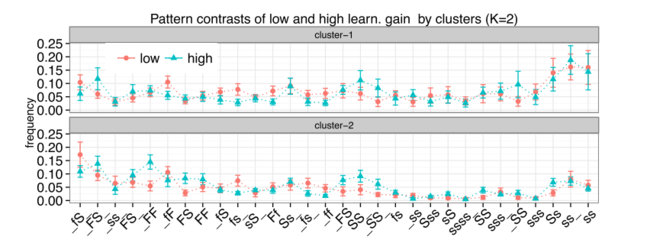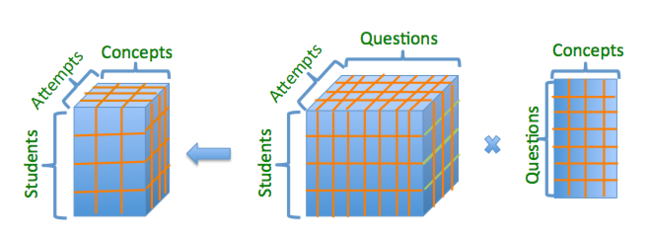Educational Data Mining
Mastery Grids aims to provide better experience to both students and instructors by using automatic tools and techniques that are derived by machine learning and data mining algorithms on its data. In this section, we introduce some of the projects performed on Mastery Grids' data for this purpose.
Contents
Problem Solving Genome for Students
In this research we study the students' behavioral patterns in attempting quizzes and repeating them. We look at attempt sequence of students, model, and examine patterns of student behavior with parameterized exercises. Starting with micro-patterns (genes) that describe small chunks of repetitive behavior of students, we construct individual student profiles (genomes) as frequency profiles. These profiles show the dominance of each gene (repetitive pattern) in individual behavior. We cluster the students using these profiles and study their learning gains in relation to their constructed genome. The exploration of student genomes revealed the individual genome is considerably stable, distinguishing students from their peers. It uniquely identifies a user among other users over the whole duration of the course despite a considerable growth of student knowledge over the course duration. While the problem complexity does affect the behavior patterns as well, we demonstrated that the genome is defined by some inherent characteristics of the user rather than a difficulty profile of the problems she solves. In the group level, all students can be most reliably split into just two cohorts that differ considerably by their behavior. After that split, we are able to contrast successful and less successful learners by their behavior and identify “beneficial” and “harmful” genes for each cohort. In particular, it is interesting to observe that the behavior of successful learners in one cohort is somewhat closer to the behavior of the opposite cohort.
Tensor and Matrix Factorization in Predicting Student Performance
This research aims to predict success and failure of students in future questions using collaborative-filtering approaches including tensor and matrix factorizations. One of the benefits of these models is their ability to estimate the underlying skills of questions automatically. In this work, we research on these approaches on educational data in two settings: considering the attempt (time) sequence of students and considering the underlying concept structure of questions. We compare these approaches with state of the art methods such as Feature-Aware Student knowledge Tracing (FAST), Bayesian Knowledge Tracing, and Performance Factor Analysis.
Feedback-Driven Tensor Factorization or Simultaneously Modeling Student Knowledge and Course Content
Although the tasks of domain modeling, predicting student performance, and student knowledge modeling are interrelated, these problems are usually addressed separately in the literature of educational data mining. Also, the traditional tensor and matrix factorization algorithms, that can extract the domain model while predicting student performance, are not designed for educational purposes: these models ignore the fact that students' knowledge in each step is related to her knowledge in previous steps and the concepts she is practicing while taking current learning resources. In this work, we propose a tensor factorization algorithm that can simultaneously perform all of the aforementioned tasks, while imposing a constraint to increase the knowledge of students using the feedback it receives from the current learning resources.
Exploring Problem Solving Paths in a Java Programming Course
Assessment of students’ programming submissions has been the focus of interest in many studies. Although the final submissions capture the whole program, they often tell very little about how it was developed. In this paper, we are able to look at intermediate programming steps using a unique dataset that captures a series of snapshots showing how students developed their program over time. We assessed each of these intermediate steps and performed a fine-grained concept-based analysis on each step to identify the most common programming paths. Analysis of results showed that most of the students tend to incrementally build the program and improve its correctness. This finding provides us with evidence that intermediate programming steps are important, and need to be taken into account for not only improving user modelling in educational programming systems, but also for providing better feedback to students.
Publications
- Guerra, J., Sahebi, S., Lin, Y.-R., and Brusilovsky, P. (2014) The Problem Solving Genome: Analyzing Sequential Patterns of Student Work with Parameterized Exercises. In: J. Stamper, Z. Pardos, M. Mavrikis and B. M. McLaren (eds.) Proceedings of the 7th International Conference on Educational Data Mining (EDM 2014), London, UK, July 4-7, 2014, pp. 153-160 (presentationpaper)
- Sahebi, S., Huang, Y., and Brusilovsky, P. (2014) Parameterized Exercises in Java Programming: Using Knowledge Structure for Performance Prediction. In: Proceedings of The second Workshop on AI-supported Education for Computer Science (AIEDCS) at 12th International Conference on Intelligent Tutoring Systems ITS 2014, Honolulu, Hawaii, June 6 2014. (paper)(presentation)
- Sahebi, S., Huang, Y., and Brusilovsky, P. (2014) Predicting Student Performance in Solving Parameterized Exercises. In: S. Trausan-Matu, K. Boyer, M. Crosby and K. Panourgia (eds.) Proceedings of 12th International Conference on Intelligent Tutoring Systems (ITS 2014), Honolulu, HI, USA, June 5-9, 2014, Springer International Publishing, pp. 496-503, (paper) (presentation)
- Hosseini, R., Vihavainen, A., and Brusilovsky, P. (2014) Exploring Problem Solving Paths in a Java Programming Course. In: Proceedings of Psychology of Programming Interest Group Annual Conference, PPIG 2014, Brighton, UK, June 25-27, 2014, pp. 65-76. (paper) (presentation)



